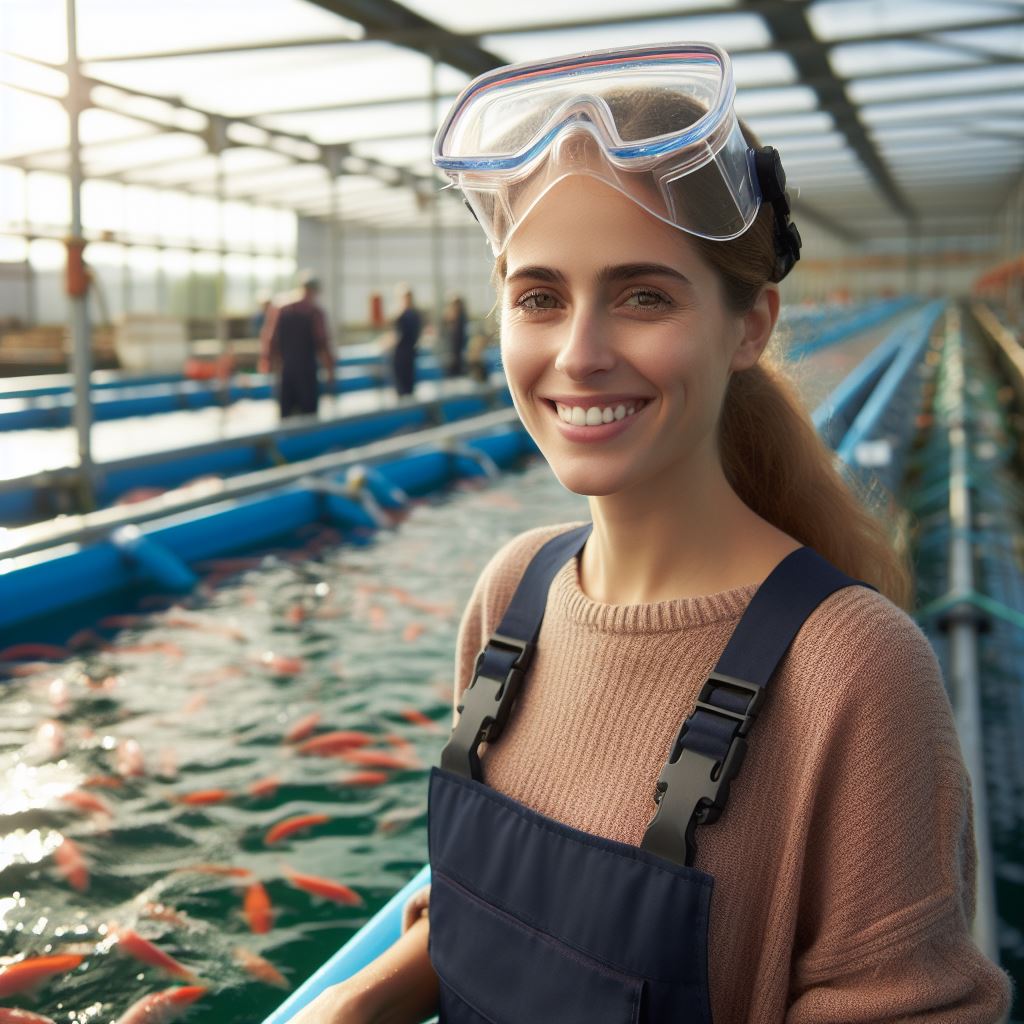Introduction
In the realm of Aquaculture Tech, mastering essential skills is key to success. Dive into the dynamic world of aquaculture with the right expertise:
- Digital Literacy: Acquire proficiency in data analysis tools and farm management software.
- Water Quality Management: Master techniques to monitor and maintain optimal aquatic conditions.
- Sustainable Practices: Embrace eco-friendly methods for responsible aquaculture.
- Species-specific Knowledge: Deepen understanding of varied aquatic species and their unique needs.
- Problem-solving Aptitude: Develop sharp analytical skills to address challenges swiftly.
- Technical Proficiency: Stay updated on cutting-edge technology shaping the aquaculture landscape.
- Regulatory Compliance: Navigate the regulatory framework governing aquaculture practices in the UK.
- Communication Skills: Effectively convey ideas to colleagues and stakeholders for seamless collaboration.
Embark on your aquaculture journey armed with these skills, ensuring a prosperous and impactful career in the UK.
Overview of aquaculture tech
What aquaculture tech entails
Aquaculture tech, also known as fish farming, is an innovative approach to fish production that harnesses technology to maximize efficiency and sustainability.
It involves the cultivation of various aquatic organisms, such as fish, shellfish, and plants, in controlled environments like tanks or ponds.
Aquaculture tech entails a combination of scientific knowledge, technical skills, and practical expertise.
It requires a solid understanding of biology, water chemistry, and genetics to ensure the well-being and optimal growth of aquatic organisms.
Additionally, proficiency in operating and maintaining aquaculture systems and equipment is vital.
Applications and benefits in the UK
The applications of aquaculture tech in the UK are vast and significant.
Firstly, it plays a crucial role in meeting the increasing demand for seafood, reducing reliance on wild fish stocks, and ensuring food security.
Aquaculture tech also provides a sustainable alternative to traditional fishing methods, which can deplete natural resources and harm marine ecosystems.
The benefits of aquaculture tech extend beyond food production. It fosters local economic development by creating jobs, particularly in rural coastal areas.
It also stimulates innovation and technological advancements, as researchers and industry professionals constantly strive for more efficient and eco-friendly practices.
The various sectors within aquaculture tech
Within the aquaculture tech sector, numerous specialized areas offer exciting career opportunities.
Hatchery management involves the controlled breeding, hatching, and rearing of aquatic organisms, ensuring the production of healthy and robust stocks.
Water quality management focuses on maintaining optimal water conditions to promote the growth and health of aquatic organisms.
Personalized UK Career Consulting
Receive tailored career guidance designed just for you. Get actionable steps and expert support to boost your career in 1-3 days. Take control of your career now.
Get StartedAquatic nutrition specialists formulate and develop feeds tailored for different species, ensuring balanced diets and healthy growth.
Fish health management involves disease prevention, diagnosis, and treatment to maintain the well-being of the fish population.
Aquaculture engineers design, construct, and maintain aquaculture systems and facilities, including tanks, ponds, and recirculating systems.
Notably, aquaculture tech also encompasses research and development. Scientists explore new techniques and technologies to improve productivity, sustainability, and environmental impact.
They investigate selective breeding methods, disease resistance, and alternative feeds to enhance efficiency and reduce the industry’s ecological footprint.
In essence, aquaculture tech is a dynamic and rapidly growing sector in the UK. With the increasing demand for seafood and the need for sustainable practices, it offers exciting career opportunities.
To be successful in this field, individuals need a combination of scientific knowledge, technical skills, and practical expertise.
Whether involved in hatchery management, water quality, nutrition, fish health, or engineering, professionals contribute to the growth and development of this vital industry.
Technical skills required in aquaculture tech
- Knowledge in aquaculture biology and ecology
- Expertise in water quality management and monitoring
- Understanding aquaculture systems and infrastructure
- Experience in fish health management and disease prevention
- Skills in feeding and nutrition management
- Proficiency in aquatic animal handling and husbandry
- Ability to operate and maintain aquaculture equipment
- Competence in data collection and analysis
knowledge in aquaculture biology and ecology
Aquaculture tech professionals must have a deep understanding of aquatic organisms, their biology, and the ecological principles that govern their well-being.
This knowledge helps in making informed decisions regarding species selection, reproduction, growth, and environmental impacts.
Water quality management and monitoring
Ensuring optimal water quality is crucial for the success of aquaculture operations.
Experts in this field understand the parameters that affect water quality, such as temperature, oxygen levels, pH, and ammonia concentration.
They implement proper monitoring and treatment techniques to maintain suitable conditions for the aquaculture species.
Aquaculture systems and infrastructure
Having knowledge about aquaculture systems and infrastructure is essential for designing, building, and maintaining functional and efficient facilities.
Your Dream Job Starts with a Perfect CV
Get a tailored CV and cover letter that captures your unique strengths and stands out in your industry. Let us help you make an unforgettable first impression.
Get StartedAquaculture tech professionals should be familiar with different system types, such as recirculating aquaculture systems, flow-through systems, and cage systems.
They should also know about water filtration, aeration, waste management, and maintenance requirements.
Other essential skills and knowledge in aquaculture tech:
- Market analysis and business management skills for successful aquaculture ventures
- Understanding of aquaculture regulations and compliance with legal and environmental standards
- Knowledge of aquatic epidemiology and biosecurity measures to prevent disease outbreaks
- Ability to collaborate and communicate effectively with stakeholders and team members
- Familiarity with emerging technologies and innovations in aquaculture
- Problem-solving and decision-making abilities to overcome challenges and optimize production
- Awareness of sustainable practices and the importance of environmental stewardship
- Continuous learning and staying updated with advancements in aquaculture science and technology
Aquaculture tech professionals with a diverse set of skills can contribute to the sustainable growth and development of the industry.
They can overcome challenges, maximize productivity, and minimize environmental impacts by blending technical expertise with a holistic understanding of aquaculture biology, ecology, and system management.
Read: Aquatic Health Management by UK Experts
Digital and IT skills
When it comes to working in aquaculture tech in the UK, having digital and IT skills is essential.
The industry relies heavily on technology and data analytics, making it crucial for professionals to possess the right skills.
Role of data analytics in aquaculture tech
Data analytics plays a significant role in aquaculture tech. It involves collecting and analyzing large amounts of data to gain insights and make informed decisions.
By using data analytics, aquaculture professionals can monitor water quality, fish health, and feeding patterns, among other factors, to optimize productivity and efficiency.
IT skills, including software and hardware proficiency
IT skills are equally important in the field of aquaculture tech. Professionals need to have the proficiency to work with various software and hardware tools.
Software skills are necessary for managing data, monitoring systems, and analyzing results. On the other hand, hardware skills are essential for maintaining and operating aquaculture technology equipment.
The importance of remote sensing and telemetry in monitoring aquaculture systems
Remote sensing and telemetry are critical aspects of aquaculture system monitoring.
Remote sensing involves using satellites or other devices to collect data from remote locations, such as fish farms located offshore.
Optimize Your LinkedIn for Success
Boost your LinkedIn profile with a professional bio, keyword-rich headline, and strategic recommendations that attract recruiters. Stand out from the crowd and get noticed.
Optimize NowTelemetry, on the other hand, refers to the transmission of data from sensors to a remote location for analysis and monitoring.
Remote sensing and telemetry enable aquaculture professionals to monitor their systems in real-time, regardless of their physical location.
This capability is particularly valuable for managing large aquaculture operations spread across different locations.
The use of remote sensing and telemetry also allows for early detection of any issues or abnormalities in the aquaculture system.
By continuously monitoring the system, professionals can identify problems such as changes in water quality or fish behavior before they escalate.
This proactive approach helps prevent potential losses and minimizes the impact on the aquaculture operation.
Furthermore, having digital and IT skills is essential for aquaculture professionals to effectively communicate and collaborate with teams and stakeholders.
Technology plays a vital role in sharing information, coordinating tasks, and facilitating decision-making processes.
Generally, digital and IT skills are crucial for anyone working in aquaculture tech in the UK.
The role of data analytics cannot be understated, as it enables professionals to make informed decisions based on insights gained from analyzing large amounts of data.
IT skills, including software and hardware proficiency, are equally important for managing and operating aquaculture technology.
Lastly, remote sensing and telemetry play a vital role in monitoring aquaculture systems and ensuring their optimal performance.
Read: Aquaculture Equipment Essentials in the UK

Engineering and technology skills
Engineering and technology skills are crucial in the field of aquaculture tech. These skills play a significant role in ensuring the efficiency and success of aquaculture operations.
Importance of Mechanical and Electrical Engineering Skills
Mechanical and electrical engineering skills are essential in aquaculture tech for several reasons:
- Designing and developing efficient aquaculture systems.
- Installing and maintaining equipment, ensuring smooth and uninterrupted operations.
- Repairing and troubleshooting malfunctions in mechanical and electrical systems.
- Improving energy efficiency and reducing environmental impacts.
- Ensuring compliance with safety standards and regulations.
- Optimizing production processes and maximizing yields.
- Developing innovative solutions to address challenges in aquaculture.
Proficiency in Robotics and Automation
Robotics and automation have revolutionized the aquaculture industry, making it more efficient and productive. Proficiency in these areas is vital for various reasons:
- Automating repetitive tasks, saving time and reducing labor costs.
- Monitoring and controlling crucial parameters in real-time.
- Improving accuracy and precision in feeding, water quality management, and harvesting.
- Enabling remote operation and monitoring, increasing flexibility and accessibility.
- Enhancing data collection and analysis, leading to better decision-making.
- Facilitating the integration of artificial intelligence and machine learning algorithms.
Aquaculture Equipment Design and Maintenance
Aquaculture equipment design and maintenance are critical aspects of ensuring efficient and sustainable operations. Here’s why:
- Proper equipment design reduces stress on aquatic organisms, promoting their health and growth.
- Well-designed equipment improves water circulation and oxygenation, creating optimal conditions.
- Regular maintenance prevents equipment breakdowns and ensures continuous operations.
- Maintenance also extends the lifespan of equipment, reducing the need for frequent replacements.
- Efficient equipment reduces resource wastage, such as water and energy.
- Regular inspections and maintenance help identify and address potential hazards or safety risks.
- Upgrading equipment based on technological advancements can lead to higher productivity.
Basically, aquaculture tech heavily relies on engineering and technology skills. Mechanical and electrical engineering skills are vital for designing, installing, and maintaining aquaculture systems.
Proficiency in robotics and automation enables improved efficiency and productivity. Adequate aquaculture equipment design and maintenance ensure sustainable operations and optimal performance.
Read: Aquaculture in the UK: Education Pathways
Environmental and sustainability skills
Environmental and sustainability skills are crucial in the field of aquaculture technology in the UK. These skills enable professionals to monitor and assess the environmental impact of aquaculture practices.
Additionally, they help in promoting sustainable methods and managing waste and water effectively.
Environmental monitoring and impact assessment
Environmental monitoring and impact assessment play a vital role in aquaculture.
By continuously monitoring water quality, temperature, and oxygen levels, professionals can ensure a healthy and suitable environment for aquatic organisms.
This monitoring helps identify any potential issues and allows for timely interventions.
The significance of environmental impact assessment lies in its ability to evaluate the consequences of aquaculture activities on the surrounding ecosystem.
It helps identify potential risks to biodiversity, such as the release of excessive nutrients or the spread of diseases.
This assessment ensures that aquaculture operations are carried out in a sustainable and responsible manner.
knowledge in sustainable aquaculture practices
Sustainable aquaculture practices are essential for the long-term viability of the industry.
Professionals need to have a comprehensive understanding of sustainable practices, including responsible fish stocking densities, appropriate feed management, and proper waste disposal techniques.
This knowledge ensures the minimal ecological footprint of aquaculture operations while maximizing productivity.
Waste management and water treatment in the industry
Waste management and water treatment are critical components of sustainable aquaculture.
Professionals must have the skills to develop and implement effective waste management systems that minimize the release of pollutants into surrounding waters.
They should also possess knowledge of water treatment techniques, such as biofiltration and recirculating systems, to maintain water quality and minimize environmental impact.
Effective waste management practices involve the proper handling and disposal of fish waste, uneaten feed, and other byproducts.
Professionals should be knowledgeable about techniques such as composting and anaerobic digestion to convert organic waste into valuable resources.
By employing these practices, the industry can minimize its impact on water quality and reduce the risk of harmful algal blooms and other environmental disruptions.
Water treatment is essential to maintain optimal conditions for aquaculture. It involves the removal of pollutants, such as excess nutrients and harmful chemicals, from the water.
Professionals need to possess the skills to design and operate appropriate treatment systems, such as mechanical filters and biological reactors, to ensure water quality and mitigate the risk of pollution.
To sum it up, environmental and sustainability skills are crucial in the UK’s aquaculture technology sector.
Professionals need to possess expertise in environmental monitoring and impact assessment to ensure responsible and sustainable practices.
Knowledge of sustainable aquaculture practices, waste management, and water treatment is vital in minimizing the industry’s ecological footprint and ensuring long-term viability.
By prioritizing these skills, the aquaculture industry can thrive while safeguarding the environment.
Read: Sustainable Practices in UK Aquaculture Tech
See Related Content: Career Spotlight: Women in Forestry
Explore Further: Education Pathways for Aspiring Foresters
Business and Management Skills
Financial and budgeting skills in aquaculture tech
- Financial and budgeting skills are crucial in aquaculture tech to ensure profitability and sustainability.
- Proper financial management enables effective allocation of resources and identification of cost-saving opportunities.
- Budgeting skills help in forecasting expenses, pricing products, and monitoring financial performance.
In aquaculture tech, having business and management skills is crucial. Financial and budgeting skills play a significant role as they ensure profitability and sustainability.
With proper financial management, resources can be effectively allocated, and cost-saving opportunities can be identified.
Additionally, budgeting skills help in forecasting expenses, pricing products, and monitoring financial performance.
Marketing and Sales Skills
- Successful marketing is essential to promote aquaculture products and attract customers.
- Sales skills are necessary to understand customers’ needs and preferences and effectively communicate the benefits of aquaculture products.
- Marketing and sales strategies help in expanding market reach and increasing product demand.
Marketing and sales skills are also essential in the aquaculture industry. Successful marketing strategies are necessary to promote aquaculture products and attract customers.
Understanding customers’ needs and preferences is crucial for determining target markets and tailoring products accordingly.
Furthermore, adept sales skills are required to effectively communicate the benefits of aquaculture products and close deals.
By implementing appropriate marketing and sales strategies, the market reach can be expanded, and product demand can increase.
Project Management and Planning:
- Effective project management ensures smooth operations and timely completion of tasks in aquaculture tech.
- Planning helps in setting achievable goals, allocating resources, and identifying potential risks.
- Proper project management and planning increase productivity, reduce costs, and enhance overall efficiency.
Project management and planning are vital for the smooth functioning of aquaculture tech operations. Effective project management ensures that tasks are completed on time and in the desired manner.
Planning plays a crucial role in setting achievable goals, allocating resources efficiently, and identifying potential risks.
By implementing proper project management and planning techniques, productivity can be improved, costs can be reduced, and overall efficiency can be enhanced.
Aquaculture tech in the UK requires a range of skills. Business and management skills, such as financial and budgeting skills, are significant for profitability and sustainability.
Marketing and sales skills play a crucial role in promoting and selling aquaculture products. Project management and planning are essential for efficient operations and successful implementation of tasks.
Developing these skills is essential for individuals looking to thrive in the aquaculture industry.
Uncover the Details: Tech in Agriculture: UK Manager’s Toolkit
You Might Also Like: A Day in the Life of a UK Agricultural Manager
See Related Content: A Day in the Life of a UK Farmer: Real Insights
Conclusion
In closing, the aquaculture tech field in the UK requires a range of key skills. These include knowledge in biology, engineering, and data analysis.
With the growing demand for professionals in this field, there are significant opportunities for individuals with these skills.
Therefore, it is important for anyone interested in aquaculture tech to pursue relevant education and training opportunities.
By obtaining the necessary skills, individuals can excel in this field and contribute to the growth and development of the aquaculture industry in the UK.
[E-Book for Sale]
500 Cutting-Edge Tech Startup Ideas for 2024 & 2025: Innovate, Create, Dominate
$19.99 • 500 Tech Startup Ideas • 62 pages
You will get inspired with 500 innovative tech startup ideas for 2024 and 2025, complete with concise descriptions to help you kickstart your entrepreneurial journey in AI, Blockchain, IoT, Fintech, and AR/VR.




